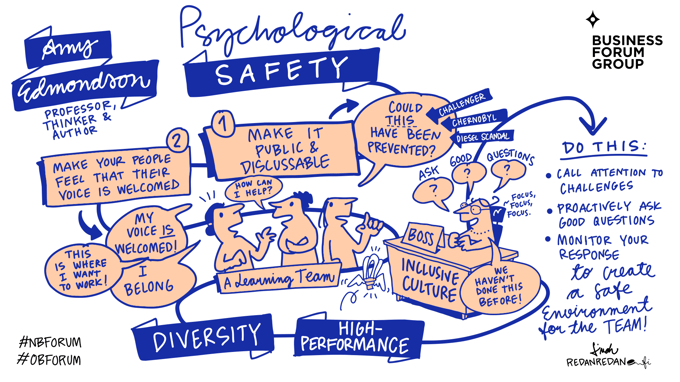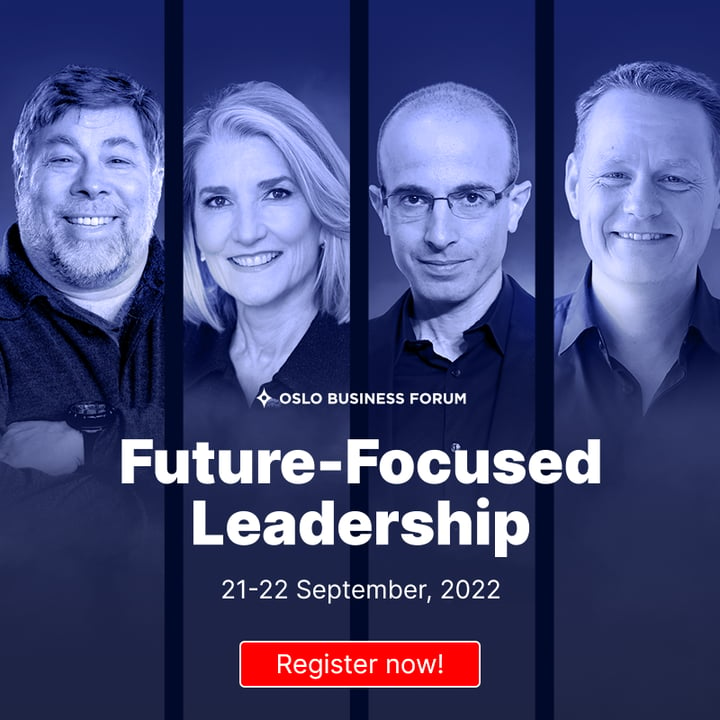On 13th of June, we got together with our friends at Nordic Business Forum and Randstad Norway to talk about psychological safety. During the webinar, Amy Edmondson, the world’s #1 management thinker and Harvard Professor, explained how to create a work culture where people are not embarrassed or afraid of being rejected for coming up with their own ideas, questions, or concerns. She also stressed why this is even more important in hybrid environments and in diverse teams that seek to innovate.
If you missed the session or want to go back to it, you can tune in for the recording here:
The impact of psychological safety
Psychological safety has become a hot topic over the last year as more people recognize its impact on business performance. Amy explained that psychological safety is not a goal in itself. “The goal might be innovation, six sigma, or quality, among others. Whatever form of excellence you are trying to achieve, you cannot do it without other people’s voices, without other people's participation,” she stated.On the other hand, environments where people are afraid to speak their minds, can lead to tragic results. Two strong examples are the Challenger and Chernobyl explosions. According to Amy, experts knew there were problems but were afraid to speak up. “A more recent case is the Volkswagen dieselgate scandal. There were health impacts and, of course, economic impact as well. These dynamics are preventable, tragic, and unnecessary. They happen when people believe their voice is not welcomed at work.”
How do you build a safe place to speak up?
The pandemic uncertain scenarios took a toll on psychological safety in companies and many leaders are now struggling to build it back. “Once you recognize that you could be at risk because people will have a hard time offering ideas, raising a concern, asking questions, you are halfway there in trying to reverse the situation,” Amy said.
The next step is to make it a team problem-solving opportunity. Amy advised leaders to openly tell people: "I need your help. We need to work together to make sure that our work environment moves forward and everybody’s voice is heard.” Each team will find its own way of responding to the challenge, depending on the nature of the work, on how remote or face-to-face it is, and other job variables.
The power of local forces
Another key contribution in Amy’s research is that psychological safety varies across teams within the same organization. In other words, leaders of small groups can have a stronger impact on their teams than top leaders. “Of course top management matters, but local forces are in many ways more powerful.”
Some of Amy’s recommendations for leaders who want to create psychologically safe work dynamics are:
- Draw frequent attention to the complex, uncertain, challenging nature of the world. Say things like: “We have never done anything like this before,” or “We are going to need each other’s input.”
- Raise good work questions: “What do you think of the customer?”, “What’s your take on the project?”
- Monitor your response relentlessly. When someone brings bad news or a dissenting voice, respond appreciatively, productively, and look forward.
How to reap the benefits of diversity
It is often believed that a team with members with different perspectives, ideas, and opinions will result in more innovation and greater performance. However, in a study of 62 innovation teams Amy conducted together with Henry Bresman, she found out that in teams without psychological safety, diversity had a slightly negative impact on performance. Only in teams with high psychological safety, was the diversity/performance ratio high.
Amy’s conclusion? To create an innovative team, the first step is to gather a group with diverse backgrounds; but in order to reap the benefits of multiple perspectives, it is necessary to foster a climate where people genuinely believe that their voice and input are well received.
 Visual Summary by Linda Saukko-Rauta
Visual Summary by Linda Saukko-Rauta
Hybrid workplaces
According to Amy, psychological safety is even more important in hybrid environments than in face-to-face workplaces. Why? Because there are more assumptions and logistical problems that have to be worked out on the fly, and this cannot be done without trust and cooperation.
As best practices, Amy mentioned companies that set up what might look as overly structured agreements. They make things more explicit than they would in any work environment; they also reach agreements on how people need to team up and collaborate to get challenging work done.
How does your leadership style affect your team?
Amy answered this question in a very straightforward way: “What really matters is not personality, which is hardwired, but leadership stances”. In fact, she pointed out three primary leadership attitudes that strongly impact the psychological safety in teams:
Humility: Leaders show confidence without arrogance, saying things like, “This is the first time we have responded to such a demanding challenge so positively.”
Curiosity: Leaders genuinely want to know what others have identified and they have missed. This open-mindedness leads them to ask probing questions and complete the picture in a more satisfactory way.
Empathy: Leaders ask themselves questions like, “How do I want people to respond to me?”, “What kind of work environment do I want to be a part of?” Then, they seek ways to respond accordingly, and make things happen.
In closing, Amy remarked that the expectation of a psychologically safe work environment has increased with each subsequent generation. As a company, you will stand a better chance of working within this mindset in the future. “That is why the topic has become so popular and a priority, a top agenda item for senior executives around the world”, she concluded.
Join us in September, and see Amy Edmondson live at Oslo Business Forum 2022: Future-Focused Leadership.
Sign up now to secure your spot!